As Arevalo inauguration approaches, Guatemalans express cautious optimism
Attacks against President-elect Bernardo Arevalo have fuelled fears of election interference ahead of his swearing-in.
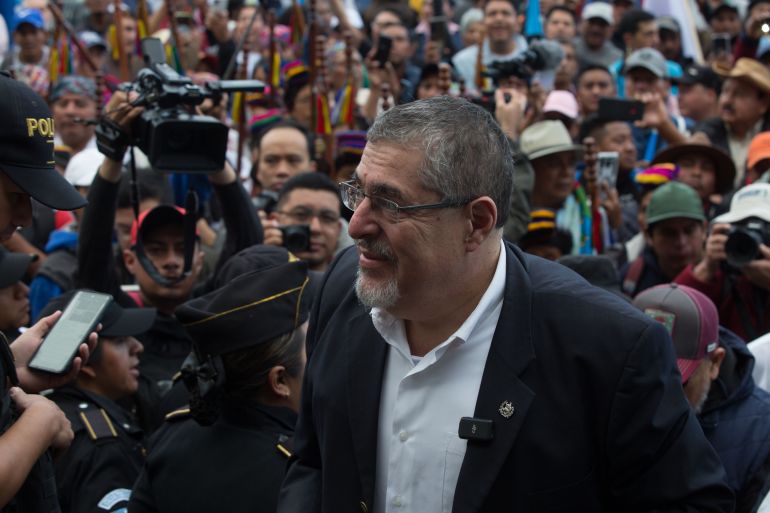
Guatemala City, Guatemala – Guatemalan President-elect Bernardo Arevalo is poised to assume office on Sunday, following his landslide victory in the 2023 presidential elections.
But Arevalo’s impending inauguration has been overshadowed by a string of recent legal attacks against him and his party — widely interpreted as attempts to overturn the vote.
Keep reading
list of 3 itemsGuatemala’s Indigenous leaders take to the streets in nationwide protests
The Take: In Guatemala, will a new presidency be ended before it begins?
Now, as he prepares to be sworn in, analysts question how much the uncertainty of the past months has weakened Guatemala’s fragile democracy and shaken public confidence.
Arevalo, an anticorruption candidate, first catapulted into the international spotlight with a surprise second-place finish in the June general elections.
Those results assured the dark-horse candidate of a spot in the run-off election — and placed a target on his back. Guatemala has long struggled with corruption in its government, and several leading candidates had already been disqualified.
Beginning in July, prosecutors under Attorney General Maria Consuelo Porras sought to suspend the legal status of Arevalo’s party, the Seed Movement, citing alleged irregularities with the years-old signatures used to form the party.
Prosecutors also pursued court orders to raid the party’s headquarters, as well as the offices of Guatemala’s election authority. In the process, boxes with sealed ballots were opened, spurring concerns of election interference.
Arevalo nevertheless delivered a commanding victory over his run-off opponent, former First Lady Sandra Torres, earning 60 percent of the vote.
But the legal actions against him continued. In November, prosecutors issued a request to strip Arevalo and his allies of their political immunity over their support for student protesters in 2022.
To date, Guatemala’s Supreme Court has not ruled on whether to lift Arevalo’s immunity, which would leave him potentially vulnerable to prosecution.
In December, prosecutors went so far as to openly question whether to annul the 2023 election results — despite assurances from the country’s election authority that the tally was “unalterable”.
All the while, the volley of legal attacks has ignited widespread outcry, both within Guatemala and from international observers. Indigenous leaders organised weeks of protest in the country, with some blocking highways and camping outside the attorney general’s office for 100 days.
The United States and European Union, meanwhile, have both imposed sanctions on officials accused of undermining the 2023 election.
But Arevalo has proceeded with his plans to take office on Sunday, announcing a largely traditional slate of cabinet picks on January 8.
In the week ahead of his inauguration, Al Jazeera spoke to residents in Guatemala City about the attacks on the country’s democratic process — and whether they are optimistic for change under the new administration.
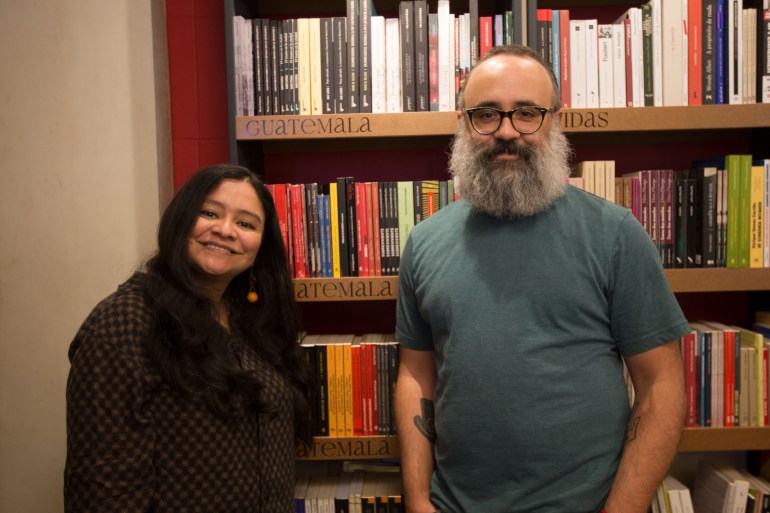
Luis Mendez Salinas, 37, author and co-owner of the publisher Catafixia from Guatemala City
“It’s strange to say, but every [legal attack] that has been made from June 25 until today — and probably until January 14 — has filled me with optimism. Because every attempt that has been made by these corrupt political elites and political clients has failed.
“2023 was a historic year. It seems to me that the crisis generated by Arevalo’s victory, paradoxically, brings with it a possibility of redirecting Guatemala along the democratic path that was opened in 1985.
“Why? Because we were seeing a very noticeable deterioration of all institutions and an authoritarian regression.
“It seems to me that the fact that the population has surged in terms of voting for a candidate who was totally outside of that system is a great lesson in the possibility of hope.”
Carmen Lucia Alvarado, 38, author and co-owner of the publisher Catafixia from Quetzaltenango
“I hope that the population understands that we are not facing a miracle. We are facing the logical reaction of a society that collectively chose an option that can give us at least a path forward.
“I hope the new government achieves the minimum to return dignity [to the people].”
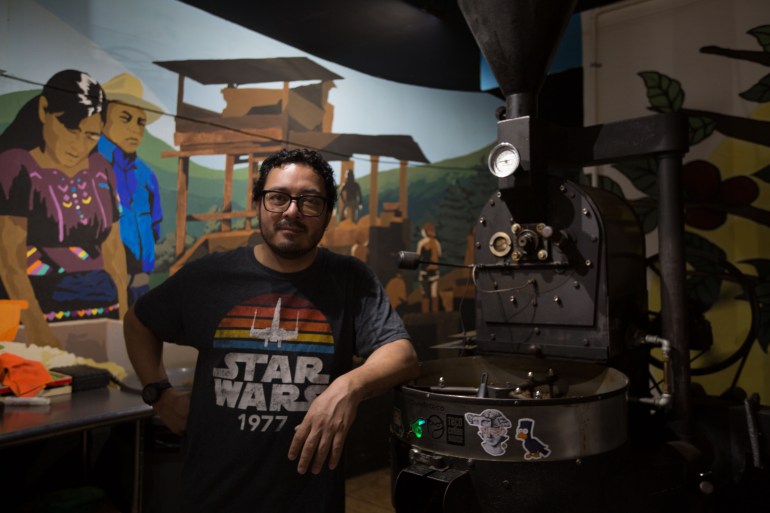
Jose Miguel Echeverria, 36, coffee roaster and small business owner from Guatemala City
Echeverria was hopeful Arevalo’s administration would follow through with its promises to improve Guatemala’s healthcare and roadway infrastructure, but he expressed frustration with the highway blockades that accompanied pro-democracy protests in recent months.
“The situation has been difficult and complex.
“The roadblocks in October really affected the country. We were afraid that, if they lasted longer than 15 days, we would have to lay off people.
“Sooner or later, these political conflicts will begin to affect small- and medium-sized businessmen and entrepreneurs. That is the most difficult issue, because we understand that the country’s situation is difficult. We also understand that there is horrible corruption that is taking advantage of our taxes. But on the other side, slowing [corruption] is sometimes complex, because no one knows where to start.
“The only job of the politicians — of the president, of Congress, those who are developing policies — is to meet the needs of the people.”
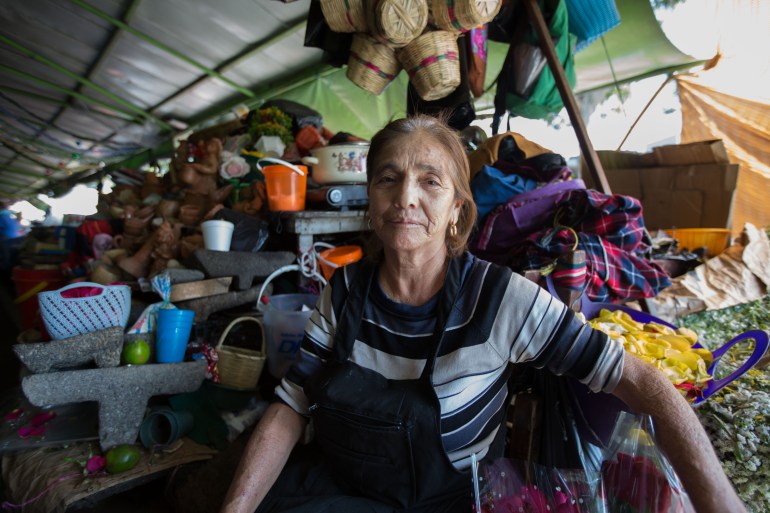
Elsira Rodriguez, 70, flower vendor from San Pedro Sacatepequez
“Everything [about the election crisis] has been bad for us. We do not have a government that supports us.
“We hope to God that Arevalo is also a responsible person, that he fulfils what he promised us, and that he fulfils [the promise to] provide for security.
“We truly hope that this new government will come to change everything.”
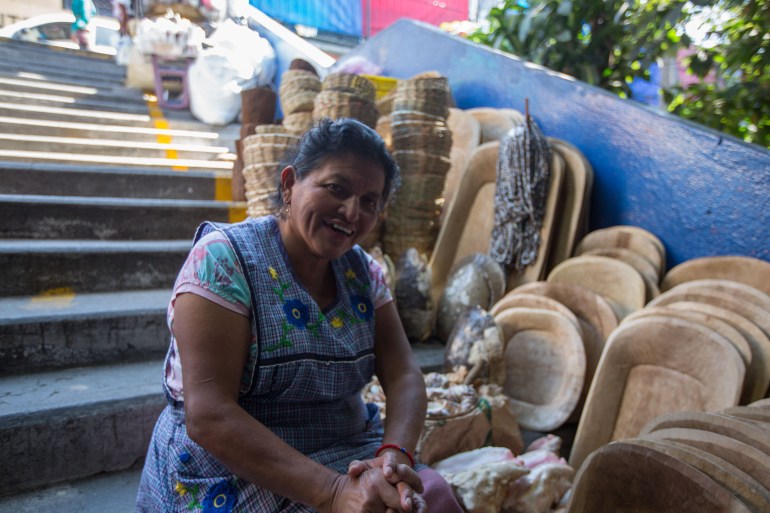
Romelia Jalal, 58, vendor of artisanal crafts from Tactic
Jalal said she is cautiously optimistic about Arevalo’s government. She credited the attacks on his campaign to establishment politicians refusing to accept defeat.
“People do not know how to lose. Maybe [Arevalo] has new purposes, new goals, something new for Guatemala, but we Guatemalans do not know how to lose.
“The governments [we have had] have not known how to govern, and it is known that they steal.
“It is a matter of waiting to see what the new laws there are, what the new president does. No one knows what is coming.
“Let’s hope that they [the members of the Arevalo administration] are going to be different. Hopefully, it will be something different, something new, which we have not seen before.”
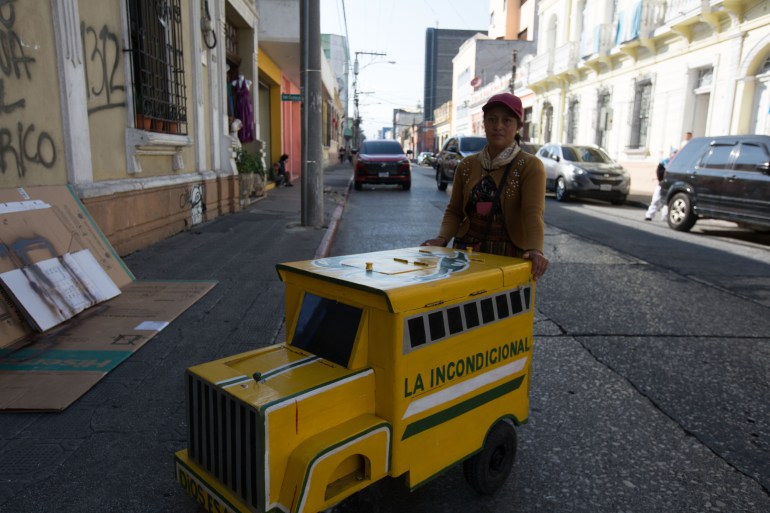
Milda Diego, 28, ice cream vendor from Santa Eulalia
“It has been difficult. The current government has made life more difficult for us.
“Governments do not do anything. Right now, [we] are fighting for [our] lives. It’s just that the governments don’t help.”